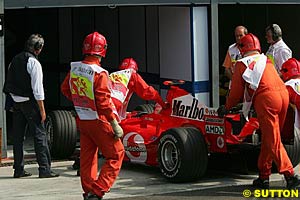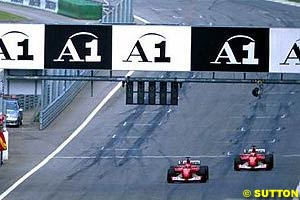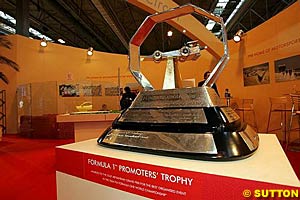Atlas F1 Magazine Writer
Fresh from the Formula One paddock
Remember Silverstone last year? When Michael Schumacher deliberately spun away his chances during pre-qualifying in order to gain a better slot during the definitive session? Of course, the German - and numerous others who played the qualifying loophole to advantage - were slated by drenched fans and the bemused media, but the teams cared not a jot. Loopholes in Formula One seemingly exist for cars to be driven through. Sideways, if necessary. And, if criticism of Schumacher et al is analysed, it was not the exploitation which grated, but the clumsy manner in which it was effected.
Exploiting rules and regulations, pushing interpretations to their maximum, has been part and parcel of Grand Prix racing for the last century, at least, and will continue to be so for as long as the pastime exists. Former Penske Grand Prix driver Mark Donohue entitled his biography 'The Unfair Advantage', and, having scored a podium in his first Grand Prix, plus won the Indianapolis 500 classic - as well as the Can-Am championship in a monster 1,400 bhp Porsche 917 - mainly through the art of regulatory exploitation, would appear to have been as eminently qualified as any other to comment upon the 2005 regulations. Alas, the crew-cut American was killed during the 1975 Austrian Grand Prix weekend, but his legacy lives on whenever rules with grey areas are introduced.
Mosley, of course, has a point with his first point. But, and herein lies the rub, exploitation need not be habitual to be effective; nor, for that matter, need any advantage gained there from be big. In Formula One advantage is advantage, full stop.
Team managers worthy of operating in Formula One are paid to study and quantify loopholes. Remember Minardi's withdrawal of both cars from the 2003 Australian Grand Prix qualifying session to enable them to bung them up with fuel for the race? How McLaren elected the next day to start Kimi Raikkonen from the pitlane after he screwed up his qualifying?
Two different exploitations of the same, newly-introduced rule (which required you qualified with race fuel weight) by team at opposite ends of the pitlane. In both instances the immediate advantages were 'not that big', yet Raikkonen's eventual third place in the race set him up to challenge Schumacher all the way to Suzuka. Had McLaren not exploited that small advantage in March the title chase would surely have been over by Indianapolis in September and not gone through to October.
Just why would those two teams not exploit the latest tyre and engines regulations, even if only once? And, why would the rest not do so, regardless of perceived advantage. Should drivers be running out of the points in their second race on an engine 'set', why not command them over in order to start the next race on a fresh engine? Consider that teams fear Malaysia - with its tropical heat - the most. And, as it turns out, it will be the second race in an engine set. Surely better to withdraw a driver traipsing around Albert Park, Melbourne in a non-points scoring position to provide him with a fresh engine for Sepang?
Once the way has been shown by McLaren and Minardi in Australia, by Michael at Silverstone, the die is cast, and all others merely awaited similar opportunities. As Ferrari proved in Austria 2002, no amount of public castigation is too large if the ultimate prize is the World Championship - and, let us be pragmatic, 'switching' Rubens Barrichello and Schumacher was a relatively minor action with no discernible advantage.
Ditto tyres. At the launch of Williams' FW27, Patrick Head was cautious about the likelihood of a team habitually having punctures, but agreed that loopholes existed as the regulations stood. And, no matter how small (or big) the advantages, teams are likely to leap at grasping opportunities whenever they arise through circumstance. Head stated that he believed "the FIA would look at some body who regularly changes tyres at half distance", and maybe the governing body will do so. But, so what? Whilst regulations permit the changing of tyres - regardless how defined - teams will exploit the regulation whenever possible. That, simply, is the nature of the beast.
In the final analysis, 'advantage' is relative: if, to Minardi, it presents the opportunity of scoring a point next time out, you can bet the canny Paul Stoddart will be right there; if, to Ferrari, Schumacher is running out of the points, as he was in China last year, and needs to win the next race to secure the title, as he did in Japan the year before, here is betting Jean Todt will command him to pull over with 'hydraulic' or similar failure as mechanics ready a new engine for the next race. And, rather than 'spin' out of the race (ala Silverstone) on the last lap, Schumacher will merely park. No accusations of clumsiness, see...
What could be 'unfair' about that? Mark Donohue would have loved 2005.
Has Bahrain been taking lessons from Malaysia? The Indian Ocean's hoteliers were quick off mark when it came to increasing prices during 'the Formula One' GP, with some pushing up room rates by 500%.
But now, if reports reaching this column are correct, Bahrain is not only following suit, but could even be quadrupling upon Malaysia's already outrageous increases. Rumours of room rates of up to $1,000 per night (with three-night minimums) are circulating, and, with average rates in the island state running at $50 per person per night during non-Grand Prix periods, the increase factor could well be as much as 2,000%!
Of course, Grands Prix, particularly those enjoying government support and funding, are fundamentally tourism and region-economic initiatives, and, as such, need to provide reasonable returns on capital invested and hosting fees demanded by the commercial rights holder - and, Bahrain, with its unique, oasis-style 'Circuit in the Sand', is no exception.
Construction of the 5.4-kilometre track was fraught with engineering challenges as solutions were sought to overcome the effects of sandstorms and effects of the country's harsh climate extremes.
Lessons were learnt last year, and recently all the stabilised, 'bonded' soil surrounding the track was replaced with sand-coloured tarmac, whilst grass has been planted to further the facilities 'oasis' theme. In addition, BIC recently upgraded its general admission area to grand stand seating, and boasts that 'all fans coming to the race will have a grandstand seat'.
Ultimately the circuit hopes to attract 60,000 spectators to the Middle East's only Formula One race - estimates placed last year's attendance at between 9.000 and 30.000 paying spectators - and, certainly, the organisers' chances of achieving that target are not aided by such rumours.
Malaysia, which attracted 180,000 spectators to its inaugural race in 1999, has seen attendances drop by 50% since, and, Bahrain, which attracted less than one fifth that last year, surely cannot afford similar drops in the future, particularly with neighbouring Dubai developing its own A1 Grand Prix series, and Turkey coming on stream with a Formula One race in August.

 Donohue would have probably loved certain aspects of the latest regulations. During his annual meeting with the British media last week, FIA President Max Mosley allegedly suggested fears that teams would exploit loopholes regarding engine and tyre replacements were unfounded. "If somebody did it habitually we would know. The advantage you get isn't that big," reports have Mosley as saying.
Donohue would have probably loved certain aspects of the latest regulations. During his annual meeting with the British media last week, FIA President Max Mosley allegedly suggested fears that teams would exploit loopholes regarding engine and tyre replacements were unfounded. "If somebody did it habitually we would know. The advantage you get isn't that big," reports have Mosley as saying.
 Ferrari chose to do so lest it needed the four points Schumacher would thus gain later in the season - having walked the first five races! If Ferrari could live through that - and be fined only for a podium transgression, which was their only regulatory breach - then, surely, they can live through parking a car with a healthy, but used engine?
Ferrari chose to do so lest it needed the four points Schumacher would thus gain later in the season - having walked the first five races! If Ferrari could live through that - and be fined only for a podium transgression, which was their only regulatory breach - then, surely, they can live through parking a car with a healthy, but used engine?

 Certainly, the Bahraini Tourism Board and the Bahrain International Circuit's public relations agency are doing little to correct perceptions. Numerous calls made last week went unreturned, whilst emails sent earlier this week requesting clarity received similar treatment from both organisations. In addition, the circuit's general manager was unavailable for comment.
Certainly, the Bahraini Tourism Board and the Bahrain International Circuit's public relations agency are doing little to correct perceptions. Numerous calls made last week went unreturned, whilst emails sent earlier this week requesting clarity received similar treatment from both organisations. In addition, the circuit's general manager was unavailable for comment.
|
Contact the Author Contact the Editor |
Please Contact Us for permission to republish this or any other material from Atlas F1.
|
Volume 11, Issue 7
Articles
Interview with Narain Karthikeyan
Formula One's Tobacco Addiction
Technical Analysis: Jordan EJ15
Regular Columns
On the Road
Elsewhere in Racing
The Weekly Grapevine
> Homepage |
